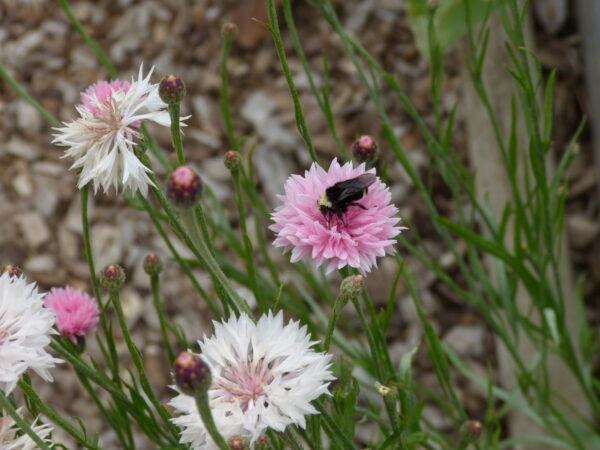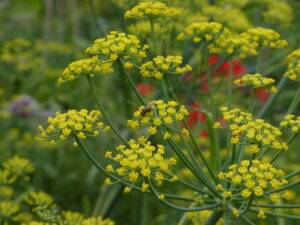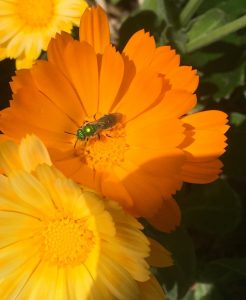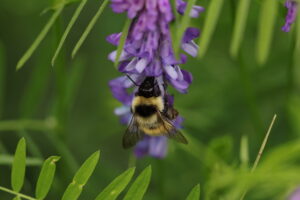
The summer solstice is nigh and we are happily gardening these days with a little more warmth and sunshine than we encountered this past spring. Many plants have finished blooming and many others are just making an appearance. Along with all those fabulous flowers follows a plethora of amazing and beneficial garden allies in the form of birds, mammals, and insects. Many of us are affected by the ick factor of insects but we want to encourage you to become familiar with the beneficial insects that occupy your garden and make it home. Many of them are doing free pest control for you!
Here are some tips to learn about who is in your garden, what they are up to and how to keep them there.
- Inspect your plants! Make it a routine to go out and look over your plants. You will find things living on your plants you may not have even known about. Good and bad!
- Know which pests might attack the things you grow. For instance if you are a veggie gardener you might find the imported cabbage worm caterpillar on your collard greens chomping away. Or aphids on your Rhododendron flowers. You might also find evidence of parasitoid wasps who have deposited eggs into those aphids, thus doing the task of eliminating them from your plant. Read up about potential pests.
- Learn about which insects are beneficial – either by pollinating your plants or as predators for plant eating pests. Less than 5% of insects in your garden are doing harm to your plants. That means the majority of those living there are either helping you keep a healthy garden or not affecting things negatively.
- Keep your garden diverse – in types of plants, shapes, flower color, season of bloom, sizes and heights, and evergreen or deciduous. The more diverse the garden, the more diverse your wildlife will be, including insects.
- Plant lots of things that bloom! Trees, shrubs, groundcovers, and perennials all can be fabulous choices for increasing the flora in your garden – each will have its own season of bloom. Choose plants that bloom a long time for the biggest impact and overlap bloom times. Add annual flowers to get continuous bloom over the summer and into the fall. Just be sure to keep trimming off old flowers to keep them going. Plant native plants too! Native fauna knows and uses native flora.

- Don’t use pesticides. Many of us reach for a spray bottle when we see aphids on our beloved roses but remember that the same sprays that kill aphids will kill beneficial insects as well. Even visiting pollinators. Some of our best friends in the garden, like lady beetle and hover fly larvae are living on the plants that have aphids, making their homes and eating their meals. Insecticides are not selective for the insect you are trying to kill, spraying will kill beneficial insects too. Even organic solutions and home made sprays are toxic to them. They are usually soap or oil based and work on good guys just like they work on bad guys.
- Let nature work its charm. Predatory insects are fewer in number than plant eating pests, like any predator -prey situation. It takes time for them to do their work – give them time to do it. Know the signs of when they are at work. Like bloated aphid bodies where parasitoid wasp eggs were laid.

- Find alternatives to PREVENT insects you know are problems. For example using floating row cover on plants susceptible to imported cabbage worm or spinach leaf miners to prevent the adult from having access to your leaves to lay their eggs on is a great prevention tool. Check the undersides of leaves for potential insect egg masses, and know which is good and which is bad so you know which to remove.
- Host pollinators by also providing nesting sites. Bare earth in dry areas of the garden, a rock pile, a log, hand made bee boxes, upside down terra cotta pots, all can be good sites for native bees to nest. Certain plants work as hosts for butterfly and moth larvae – stinging nettle for Red Admiral’s or lupine for Puget Blue butterflies. And of course milkweed for monarch butterflies.
- Above all enjoy the presence of the creatures that live in the garden with you. That is their home and you are their host. We all enjoy a little bird watching but you can have just as much fun doing a little insect watching!
YouTube videos on the Garden Hotline channel of pollinators at work taken in our home and work gardens.
Bumble Bee Queen Searches for Nesting Site
Soldier Beetles on Apiaceae Flower
WSU Monarch Release at the Good Shepherd Center Learning Garden
